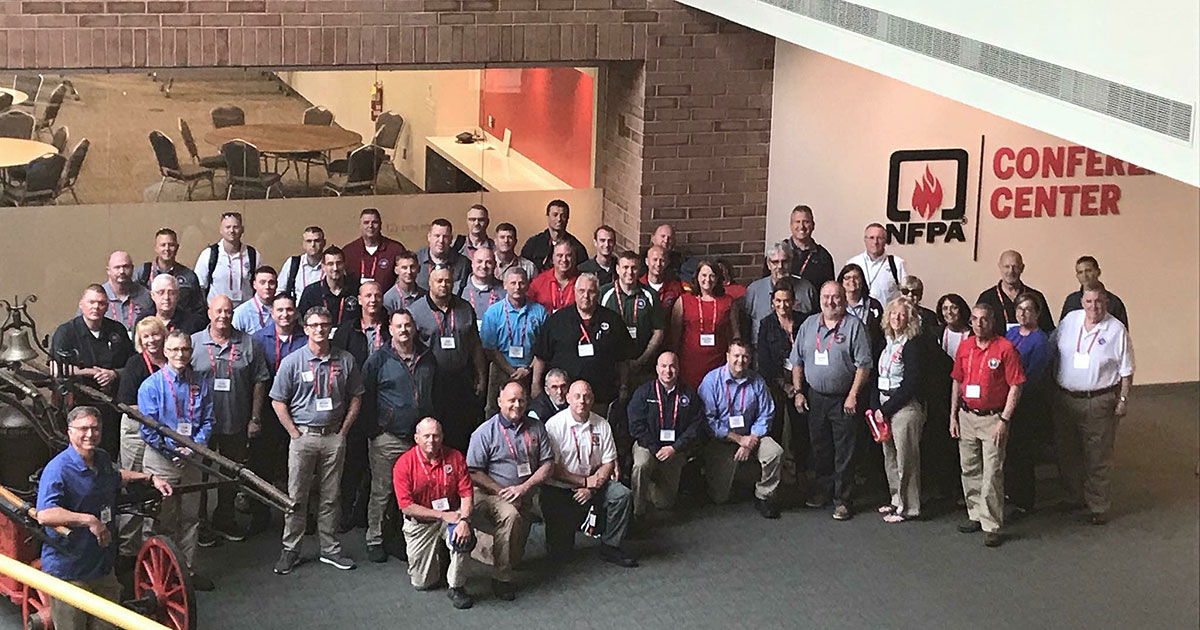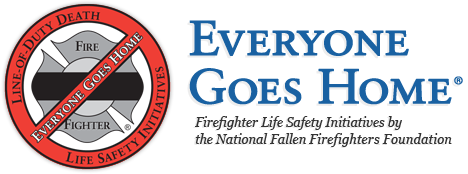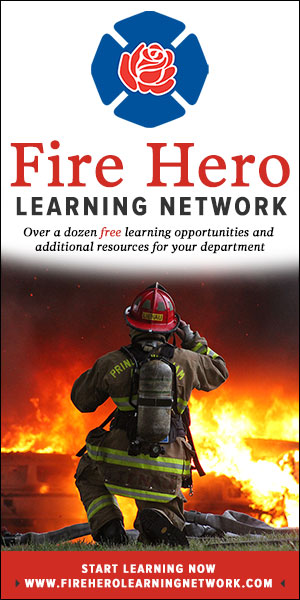
By Rick Mason, CFO
National Fallen Firefighters Foundation Education and Training Coordinator
Enthusiasm and energy were apparent among fire service leaders attending the 2018 National Everyone Goes Home® Advocates/Phoenix Society Workshop, held June 21-23 in Quincy, Massachusetts. The Advocates assembled represented the breadth of fire service organizations and ranks, including firefighters, new and tenured fire officers, chief fire officers, instructors, and even a state fire marshal and a deputy commissioner. All are true professionals, career and/or volunteer, from structural, wildland, and military organizations, sharing a common goal – to improve the health, safety, and survival of every fire service member.
Joining the group for the workshop were six representatives of the Phoenix Society for Burn Survivors, including staff members, medical professionals, and burn survivors. They shared meals and some joint sessions, and took the opportunity during the workshop to meet separately, as a focus group tasked with refining their current strategic planning efforts. Phoenix Society’s participation reinforced the importance of fire prevention and fire safety for the Advocates, and the positive interactions between both groups strengthened organizational connections, laying the groundwork for future collaboration at the local and national levels.
The first day of the workshop both groups met at National Fire Protection Association (NFPA) headquarters in Quincy. NFPA’s mission to save lives and reduce loss with information, knowledge, and passion clearly aligns with that of the Everyone Goes Home® program. Division Director Ed Conlin discussed their work in developing standards that advance best practices among the nation’s fire service organizations. He also explained the new Fire & Life Safety Ecosystem, which serves as an overarching framework for NFPA’s work with fire safety, integrating eight domains:
- Government Responsibility
- Informed Public
- Preparedness and Emergency Response
- Code Compliance
- Skilled Workforce
- Investment in Safety
- Referenced Standards
- Development and Use of Current Codes
Casey Grant, Executive Director of NFPA’s research affiliate, the Fire Protection Research Foundation (FPRF), gave the keynote presentation. He explained FPRF’s mission to plan, manage, and communicate research in support of the NFPA, discussed the roles and responsibilities of the organization, their operating principles, and the vetting mechanism for accepting research projects. A summary of FPRF’s research related to firefighter safety includes more than 60 projects divided amongst three categories: fireground operations, personal protective equipment, and fire prevention and administration.
Updates and information about the various National Fallen Firefighters Foundation (NFFF) and Everyone Goes Home® programs were presented throughout the workshop. These included Fire Hero Family programs, the National Fallen Firefighters Memorial Weekend, Local Assistance State Teams and Taking Care of Our Own® training program, stair climbs and other fundraisers, and many of the Foundation’s activities. Of particular note to the Advocates is the development of a NFFF non-profit affiliate organization, the First Responder Center for Excellence (FRCE). FRCE’s goal is to promote quality educational awareness and research and become the “go to resource” for information related to physical, emotional, and psychological health and wellness issues for all first responders.
“In the past, the structural fire service and the wildland fire service have seen themselves as worlds apart,” said Tom Harbour, retired USDA Forest Service National Director of Fire and Aviation. “But no more.” Chief Harbour is currently working with the NFFF to unite these two entities, as part of a multi-year NFFF initiative to reduce line-of-duty deaths among firefighters responding in wildland and wildland urban interface environment. He summarized a recently completed needs assessment, which included six listening sessions held around the country, that gave voice to firefighters from the breadth of stakeholder organization. The recommendations from this assessment of particular interest to this audience included adaptation of existing Everyone Goes Home® trainings to be more inclusive of wildland constituencies, expanding outreach by Advocates, and targeted marketing of the Everyone Goes Home® program to this community.
NFFF Education and Training Coordinator Rick Mason provided updates related to NFFF training and educational programs, which are integral part of the Everyone Goes Home® Advocacy effort. Advocates are required to be familiar with and complete the training programs and encourage their constituents to take advantage of these programs as well. Everyone Goes Home® training programs are available in live classes, through state partnerships, and on the Fire Hero Learning Network, where 11 modules presently reside as well as a decision-making program, customizable operational checklists, and an Emergency Services Risk Reduction Certificate Program. The Fire Hero Learning Network is located at www.fhln.net and is free of charge to departments and individual users.
Other national organizations presented information about their current work. Rhode Island State Advocate Kevin Quinn currently serves as Chairman of the National Volunteer Fire Council (NVFC). In that role, he discussed a current NVFC initiative to create a safer environment for firefighters through awareness and prevention of occupational cancers. Project Director Steve Austin of the Emergency Responder Safety Institute reviewed their safety standards, citing the current need for increased vigilance when responding in the roadway environment, when so many drivers are distracted by hand-held devices.
On day two, the group heard a very moving presentation by the Phoenix Society for Burn Survivors, led by Program Director Pam Peterson. The good news is burn survivorship rates have increased dramatically over the last decade, due in large part to advances in medical treatment. With increased survivability, outcomes are improved when survivors have strong social and emotional support systems throughout the extensive and painful treatment, upon reentering society, and later, while rebuilding their lives. A new Phoenix Society social marketing campaign, “Burns are Beautiful”, is helping survivors to find strength, beauty, and resilience in facing their physical scars. A second initiative, “It’s Time for a Hero,” advocates for a more positive representation of burn survivors in popular media. Whether in movies or on television, characters with burn scars are often portrayed as evil, mired in shame, and socially isolated. Young burn survivors in particular need to see relatable, positive portrayals of burn survivors that defy these stereotypes, and model healthy lives that include making friends, falling in love, and finding purpose and meaning.
The remainder of the second day was devoted to a presentation of the NFFF’s newest program, Attributes of Leading. Program developers Dr. Brian Crandell and Kevin Conant led the train-the-trainer session. Attributes of Leading is intended for use at the kitchen table, and focuses on six qualities of leadership: competence, grit, wellness, trust, humility, and self-regulation. Short videos for each attribute feature firefighters and officers from across the country, as well as thoughtful words from the late Chief Alan Brunacini, and are used to stimulate discussion. Feedback from the Advocates about the program was overwhelmingly positive, and many planned to take the Attributes of Leading program, as well as other information from the workshop, back to their own departments and regions.


